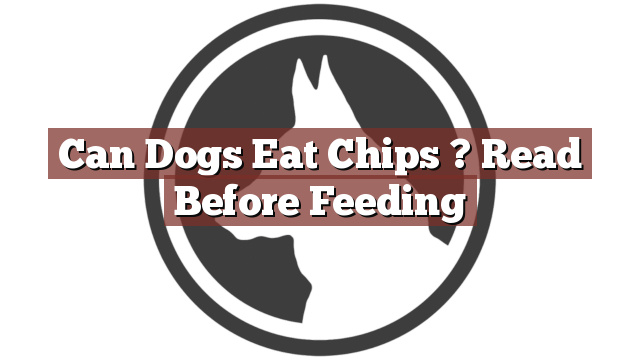Understanding Your Dog’s Dietary Needs
As a responsible pet owner, it is crucial to understand your dog’s dietary needs to ensure their overall health and well-being. Dogs require a balanced diet that consists of proteins, carbohydrates, fats, vitamins, and minerals. While commercial dog food is designed to meet these nutritional requirements, many pet owners often wonder about feeding their furry friends human food, such as chips. However, before reaching for that bag of chips, it is important to consider whether it is safe and suitable for your canine companion.
Can Dogs Eat Chips? Read Before Feeding
Can dogs eat chips? This question might have crossed your mind when you found your canine companion giving you those adorable puppy eyes while you were munching on a bag of chips. However, the answer is no. While dogs can technically eat chips, it is not recommended for a number of reasons.
Firstly, most chips are heavily seasoned with salt, which can be harmful to dogs. Consuming excessive salt can lead to dehydration, electrolyte imbalances, and even sodium ion poisoning. Additionally, the high fat content in chips can contribute to obesity and pancreatitis in dogs. Furthermore, chips often contain artificial flavors, preservatives, and other additives that can be harmful to your dog’s digestive system.
Pros and Cons of Feeding Chips to Your Dog
It is important to weigh the pros and cons before feeding chips to your dog. One of the potential benefits is that chips can provide a small amount of carbohydrates for energy. However, it is worth noting that there are much healthier options available to meet your dog’s energy needs, such as fruits or vegetables.
On the other hand, the cons of feeding chips to your dog are significant. The high salt and fat content can lead to various health issues, including obesity, heart problems, and gastrointestinal upset. Moreover, chips are devoid of essential nutrients that dogs need for their overall health, and they may cause your dog to develop an aversion to their regular dog food.
Conclusion: Proceed with Caution and Consult a Vet
In conclusion, it is best to avoid feeding chips to your dog. While they may enjoy the taste, the potential risks and lack of nutritional value outweigh any temporary satisfaction they may experience. If you ever have doubts or concerns about your dog’s diet, it is always recommended to consult with a veterinarian. They can provide you with professional guidance and help you choose the most suitable and healthy options for your canine companion’s dietary needs. Remember, a balanced and nutritious diet is essential for keeping your dog happy and healthy.
Thank you for taking the time to read through our exploration of [page_title]. As every dog lover knows, our furry friends have unique dietary needs and responses, often varying from one canine to another. This is why it's paramount to approach any changes in their diet with caution and knowledge.
Before introducing any new treats or making alterations to your dog's diet based on our insights, it's crucial to consult with a veterinarian about [page_title]. Their expertise ensures that the choices you make are well-suited to your particular pet's health and well-being.
Even seemingly harmless foods can sometimes lead to allergic reactions or digestive issues, which is why monitoring your dog after introducing any new food item is essential.
The content provided here on [page_title] is crafted with care, thorough research, and a genuine love for dogs. Nevertheless, it serves as a general guideline and should not be considered a substitute for professional veterinary advice.
Always prioritize the expert insights of your veterinarian, and remember that the health and happiness of your furry companion come first.
May your journey with your pet continue to be filled with joy, love, and safe culinary adventures. Happy reading, and even happier snacking for your canine friend!

